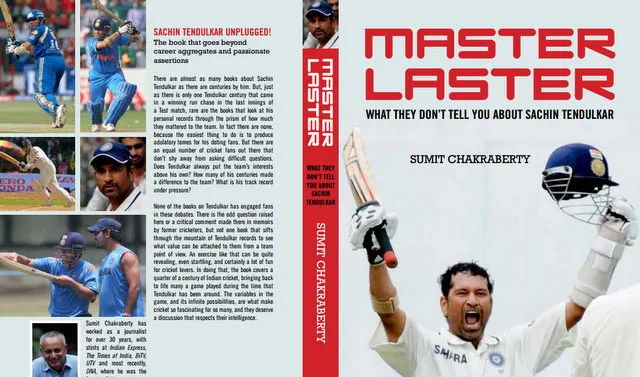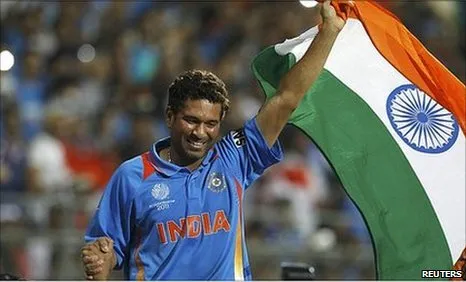What you didn't know about Sachin Tendulkar
A cricket book breaks new ground by questioning the rhapsodising over an idol and his personal milestones, while making a case for more robust ways to evaluate an individual in a team environment: Takeaways for entrepreneurs building teams
Ever since Sachin Tendulkar announced his retirement, mass media has been flooded with paeans, eulogies and plain adulation for the cricketer who has piled on more records than one can keep count of. Over the last couple of decades, Tendulkar has become larger than life, and hardly anyone dares to question his impact on results or contribution to the team. The devotion to him is such that contrarian notes, even when backed with solid stats and facts, are squashed quickly or ridiculed before they can be heard.
It is in this context that Sumit Chakraberty's just released cricket book, Master Laster: What They Don't Tell You About Sachin Tendulkar, breaks new ground. Despite the reluctance of most experts and publishers to go against the tide of a pro-Sachin marketing blitz and a humongous hero worshiping cult, this journalist thought it important to ask a few pertinent questions. For instance, how many of us know that none of Tendulkar's 51 centuries and 67 fifties were scored under pressure in the second innings to win a Test match for India outside the sub-continent?
Chakraberty chose to brave the wrath of Sachin-backers to write this warts-and-all book on a cricket god partly because [pullquote position="right"]"not everyone wants a demigod rammed down their throats."[/pullquote] Master Laster, he says, is for the millions of cricket fans who worship the game but are not blind devotees. "It is also meant for those who worship their little master, to understand the true genius of this child prodigy, how he was able to adapt his game to injury and age over the years, what his real achievements were as well as his failings," he says in the book.

Every argument made in the book is backed by data. Examples illustrate every point made. Your Story quizzes the author on the hows and whys of Master Laster.
Isn't Sachin Tendulkar the most talented batsman of his generation?
Sachin's talent is indisputable. To go overseas as a teenager and make centuries in England, Australia and South Africa was phenomenal. To adapt to three eras of cricket and the wear-and-tear on his body for a quarter of a century required a drive to succeed that is mind-boggling. But a lot of this has been well-documented. The part that tends to be glossed over is that most of his laurels relate to personal records. What about their impact on team results? To refuse to look at that is just not cricket.
How can Tendulkar score so many centuries, and still be accused of not helping India win?
The job of a batsman is not to score a century but to win the game. It is a team sport, and while it is a nice convention to cheer individual milestones, those should be an aside. Tendulkar's match-winning centuries mostly came on the sub-continent in easy conditions where others also got big runs. The exceptions were Port of Spain, Leeds and Hamilton, but even those were made in the first innings, not under pressure in the second innings.
Is it fair to expose someone to so much pressure and then gleefully say that he cracks under it?
I cannot begin to imagine the pressure he has felt every time he walked out to bat in front of worshiping home crowds. But what about matches abroad? What about the pressure on Dravid who anchored wins for India in the second innings outside the sub-continent more than once? Not once did Tendulkar cross 50 in such a scenario in his entire career. I think we have to admit this was a key weakness in the mental aspect of Tendulkar's game, instead of trying to paper it over. The master had an Achilles' heel.

How important is it to finish a match?Nothing can be more important from a match-winning point of view because time and again we have seen teams collapse in the end when a well-set batsman gets out. That's what we admire the most about Dravid and Laxman in Test cricket, and Dhoni and Yuvraj in one-day cricket - when they found themselves in a position to win the game for their country, they usually did not leave it to others to finish the job. Tendulkar rarely managed this - the exception was his fourth innings match-winning century against England in Chennai in 2008.
Tendulkar was an opener in one-day cricket. How can you expect an opener to last till the end?
You're right, maybe you can't fault Tendulkar for being a poor finisher in one-day cricket. You have to fault him though for his declining strike rate in the second half of his career. If an opener eats up overs with a below par strike rate and then gets out without making up for it, the team is going to be left high and dry. Half the time when Tendulkar got a century in this millennium, India did not win the game. Even in full career stats, his ODI batting partners Sourav Ganguly and Virender Sehwag had much higher percentages of their centuries in winning games.
Why do naysayers call him a bad captain?
Every time he became the captain, the team suffered. Twice he was captain of India, and those were both low points in Indian cricket. Even as captain of the richest and most talent-loaded franchise in the IPL, he failed to win the title. It was only after Rohit Sharma took over the captaincy that Mumbai Indians did what was expected of them from the outset, and that was no coincidence. Tendulkar just wasn't relaxed as a captain and made strategic blunders, like when he held the explosive Kieron Pollard back until it was too late in an IPL final. He also appeared to be too much of a micro-manager, which did not allow his team-mates to play their own game effectively in my opinion.
Isn't it unkind to criticise Sachin at a time when everyone is paying homage to him?
On the contrary, I'm pleasantly surprised to find there are many like-minded people who feel Sachin has stuck around far too long without deserving a place in the side. He has averaged just 22 in his last 11 Test matches on home soil. At the same time, the breathtaking debuts of Shikhar Dhawan and Rohit Sharma have shown how much batting talent there is in the country. Even now, a gifted player like Ajinkya Rahane has to wait for his fellow Mumbaikar to reach his milestone of 200 Tests before he can get a chance to play for India. So yes, a lot of people feel this farewell series against a lowly West Indies on home ground is a pathetic end to the hyper-extended career of a man who gave us great joy with his prodigious talent once upon a time. But it also marks the start of a new phase in Indian cricket which holds great promise. That's something to celebrate.
Now that he has retired, what would I get by reading Master Laster?
Cricket brings joy to millions in the country. But I believe statisticians and commentators are not serving the game's followers well by gushing over personal records and milestones. There should be better yardsticks to assess the value of players in a team sport, and the findings in this book prove it. If commentators focus more on what the team needs, cricketers too will stop attaching so much importance to personal milestones like a 52nd century or a 200th Test. That would be good for cricket and its fans.
Is there a takeaway from the book specific to readers of Your Story?
The whole book's a takeaway. But specifically, I have described in some detail how Sachin Tendulkar adapted to change. When one avenue was shut, another would open up. He never got demoralised by his tennis elbow or back spasms or the crack in a sesamoid bone in his foot - he just gave up some strokes and found new ways to score. The rules of the game changed and so did its format from one millennium to the next, and he rode with it all. He never wavered from his self-belief and commitment to success. He had the self-discipline to stick to workouts and diets, apart from the hours of batting practice, in a 24-year-long career. Juxtaposed with all that is the team dynamics and this is where it gets more complex and interesting. In any work or business environment, especially in startups where a lot of what happens is self-driven, there is often a conflict between personal goals and team or job requirements. How to keep your focus on the larger objective and let personal growth follow in its wake is something to be kept in mind always. Sachin Tendulkar lost sight of this momentarily after he was hounded for more than a year by fans and the media who would eagerly anticipate his hundredth international century before every match. Finally he made it in an ODI against Bangladesh, but he slowed down so much as he approached his personal milestone that the team fell short of runs in the end and lost the game. Had he known that would be the outcome, I am sure Sachin would have preferred to remain at a Bradmenesque 99 centuries and win the game instead.
About Sumit Chakraberty
Sumit Chakraberty, author of Master Laster: What They Don't Tell You About Sachin Tendulkar, blogs at Cricketkeeper . You can also follow him on Facebook and on Twitter.







